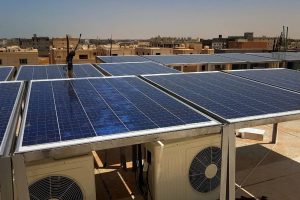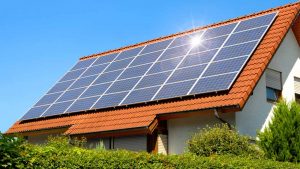Can an AC Run on Solar Power? Exploring the Feasibility of Solar-Powered Air Conditioning
The Growing Demand for Renewable Energy
The Rise of Solar Power
In recent years, the demand for renewable energy has seen a significant surge, driven by concerns over climate change and the need for sustainable alternatives. Solar power, in particular, has gained immense popularity due to its abundant availability and eco-friendly nature. As solar technology continues to advance, many individuals are now wondering if it’s possible to harness the power of the sun to run appliances like air conditioners (ACs) efficiently. In this article, we delve into the question: Can an AC run on solar power? Find what power usage air cons need.
The Basics of Solar Power
Understanding Photovoltaic Systems
To comprehend the feasibility of solar-powered air conditioning, it’s crucial to grasp the basics of solar power. Solar energy is harnessed through photovoltaic (PV) systems, which convert sunlight into electricity. PV systems consist of solar panels, inverters, batteries, and electrical wiring.
Solar panels, typically installed on rooftops or open areas exposed to sunlight, contain photovoltaic cells that generate electricity when sunlight strikes them. The generated DC (direct current) electricity is then converted into AC (alternating current) electricity by inverters, making it compatible with standard household appliances.

The Challenges of Solar-Powered Air Conditioning
Energy Consumption and Solar Panel Capacity
Air conditioning is known to be one of the most energy-intensive appliances in households. Its power requirements can vary depending on factors such as the size of the AC unit, the desired indoor temperature, and the climate. The significant challenge in running an AC on solar power lies in meeting its high energy demands.
Standard solar panels have a specific power rating, measured in watts, which indicates the maximum amount of electricity they can produce under optimal conditions. For instance, a 300-watt solar panel may generate 300 watts of power per hour. However, the power output of solar panels fluctuates throughout the day, peaking during midday and decreasing in the morning and evening. This fluctuation poses a challenge in meeting the consistent power demands of an AC, especially during peak cooling hours.
Energy Storage and Grid Connectivity
Another obstacle in running an AC on solar power is the issue of energy storage. Solar power is only generated when the sun is shining, which means there won’t be any electricity production during nighttime or cloudy days. To overcome this, energy storage solutions, such as batteries, can be used to store excess solar energy generated during the day for use when the sun is not available.
However, the size and capacity of batteries required to power an AC can be substantial and expensive. AC units typically require a large amount of electricity, and storing enough energy to meet their demands can result in significant upfront costs. Additionally, relying solely on stored solar energy may not be practical for prolonged periods of low sunlight, necessitating a connection to the electrical grid as a backup power source.
The Possibilities of Solar-Powered Air Conditioning
Advancements in Solar Technology
While running a standard AC unit solely on solar power can be challenging, advancements in solar technology offer some promising possibilities. Innovations such as high-efficiency solar panels, improved energy storage systems, and hybrid solar-AC solutions are being explored to overcome the limitations of solar-powered air conditioning.
High-efficiency solar panels, such as monocrystalline and polycrystalline panels, are capable of generating more electricity in the same amount of space compared to traditional panels. These panels utilize advanced materials and manufacturing techniques to increase their conversion efficiency, allowing for greater power output and improved performance in challenging conditions.
Furthermore, energy storage systems have seen significant advancements. Lithium-ion batteries, for example, have become more affordable and efficient, enabling better storage and utilization of solar energy. These batteries can store excess electricity generated during the day and discharge it when the AC requires power, ensuring a consistent energy supply.

Hybrid solar-AC systems combine solar power with grid connectivity to optimize energy usage. These systems leverage solar energy during the day when the sun is abundant and switch to the grid as a backup power source when solar power is insufficient. This approach provides a balance between renewable energy utilization and reliable electricity supply.
Moreover, smart technologies are emerging to enhance the efficiency of solar-powered air conditioning. Energy management systems and smart thermostats can regulate AC usage based on energy availability, weather conditions, and occupant preferences. These intelligent systems can optimize energy consumption, reduce wastage, and maximize the utilization of solar power.
Conclusion
The Future of Solar-Powered Air Conditioning
While running an AC solely on solar power remains a significant challenge, advancements in solar technology, energy storage, and hybrid systems are bringing us closer to the goal of sustainable and efficient air conditioning. As research and development continue, we can expect further improvements in solar panel efficiency, battery capacity, and cost-effectiveness.
It is important to note that the feasibility of solar-powered air conditioning depends on various factors, including the energy requirements of the AC unit, the geographical location, and the available sunlight. Consulting with solar energy experts and HVAC professionals can provide valuable insights into the suitability and potential cost savings of solar-powered AC systems for specific situations.
As the demand for renewable energy grows and the urgency to combat climate change increases, solar-powered air conditioning holds great promise. By harnessing the sun’s energy to cool our homes and buildings, we can significantly reduce our carbon footprint and contribute to a more sustainable future.
In conclusion, while there are challenges to overcome, the potential benefits of solar-powered air conditioning make it an exciting area of innovation. With continued advancements in solar technology and energy management systems, we can envision a future where air conditioners efficiently operate on clean and renewable solar power.


